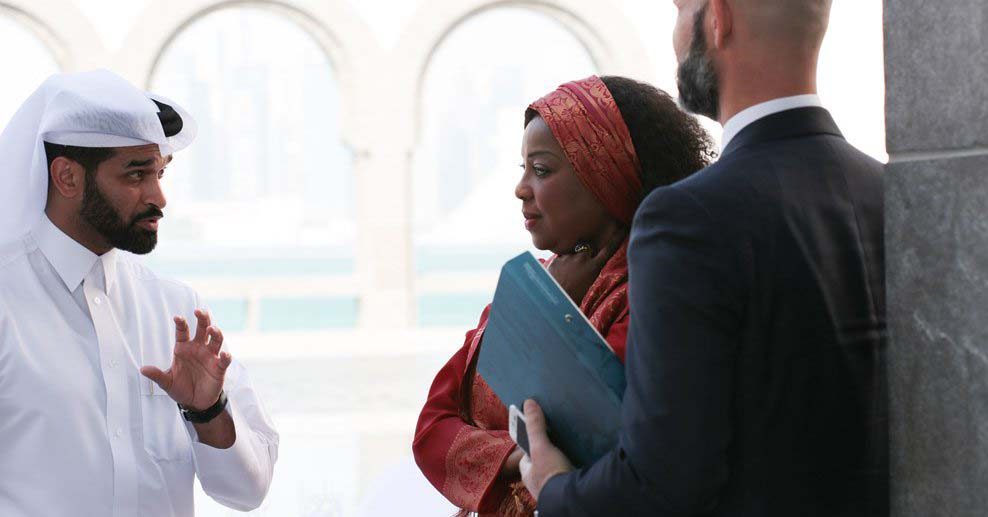
With reporting from Riham Sheble
Whether Qatar will stick to the eight stadiums it has already planned for the 2022 World Cup or add one more will be determined by the middle of next year.
During a visit to Qatar yesterday, FIFA Secretary General Fatma Samoura said:
“Discussions are ongoing about the number of stadiums and training sites. We will be able to come up with a common agreement by the end of Q2 2017.”
She also touched on human rights issues and the ongoing alcohol debate.
In its initial tournament bid, Qatar planned for 12 stadiums. However, host countries are only required to have a minimum of eight venues.
And Samoura said that the final number should take into account sustainability after the event. “White elephants should be limited to the minimum,” she added.
A decision was supposed to have been made this year, but this has been deferred. Last week, an official said it would be made “in due course.”
In an interview with Al Sharq this week, the chief executive of Qatar’s local organizing committee (LOC) Hassan Al Thawadi said that Qatar could construct up to nine stadiums if required.
In the works
Samoura took a two-hour tour of the five under-constructions stadiums so far during her first official visit to Qatar yesterday, according to a statement issued by the Supreme Committee of Delivery and Legacy (SCDL).
Timed with the delegation’s visit, the SCDL this week published progress videos showing construction progress at some of the main venues.
This includes Khalifa International Stadium, which will be the first stadium to be completed early next year.
Tonight it’s #Qatar vs #Russia – the kind of match Khalifa International Stadium is being prepared for! pic.twitter.com/vr3Rni2mGj
— Road to 2022 (@roadto2022) November 10, 2016
Qatar has previously said that 2022 spending will not be affected by austerity measures and budget cuts amid lower global oil prices.
However, Al Thawadi told Al Sharq that private funding is now being considered to build Ras Abu Aboud stadium and training pitches.
The venue is one of the three for which designs have yet to be revealed.
Workers’ welfare
Samoura said during a media briefing yesterday that her delegation’s main focus was to ensure workers’ welfare is being upheld.
“We keep urging the Qatari government to accelerate the worker reform process,” she said.
She added that plans to establish a human rights advisory board that would consult with FIFA are also “advancing.”

One of the challenges for Qatar’s Local Organizing Committee is to develop ties with international trade union organizations and groups that champion workers’ rights.
These include the UN’s International Labor Organization (ILO) and the Building and Wood Workers’ International (BWI), Samoura added.
However, unions are largely illegal in the country and these groups have previously been critical of Qatar and its treatment of blue-collar workers.
“We want to broaden the partnership with the ILO and BWI. The Supreme Committee and the LOC have already taken it very seriously,” she added.
Scrutiny
Following a visit to Qatar in March this year, the ILO warned Qatar to take action to improve rights for migrant workers in the country or risk a possible UN investigation.

The country continues to face international scrutiny for the welfare of the hundreds of thousands of expats who work here, predominantly in its construction industry.
Earlier this week, Amnesty International and Human Rights Watch criticized UK trade minister Greg Hands.
He was in Qatar to drum up business, but did not the issue of workers’ rights in a article he wrote for The Peninsula.
Measures taken
While admitting Qatar faces “several challenges” on human rights and workers’ welfare, Samoura acknowledged the “immediate measures” that were taken following the first work-related death on a stadium site.
That was when Nepali construction worker Anil Kumar Pasman was killed by a water truck last month.

Asked about criticisms leveled at Qatar for its worker’s rights, Samoura said:
“I don’t waste my time answering these… everywhere you go, there are human rights issues. Qatar and Russia are no exceptions.”
Samoura added that she was confident that Qatar would deliver the “best world cup.”
Finally, the issue about whether Qatar’s stadiums will sell alcohol remains unconfirmed, the secretary general said.
“No decision has been taken,” she added.
Al Thawadi said this week that he was “personally against the provision of alcohol in stadiums.” But he did not go as far as ruling out its sale at the venues.
Samoura said: “We do respect the customs and culture of the country and the last thing FIFA would like to be accused of is to pretend it does not pay attention to these customs.”
Thoughts?







